The simplest form of RAW is the four bead unit, stitched in flat rows. This technique is great for bracelets and rings, but can also be adapted to make 3-D objects, beaded beads and more.
To make a basic strip of flat right angle weave:
On a comfortable length of thread, use a stop bead to mark a six inch tail. This is optional, but helps to keep the first few stitches steady as you work.
Pick up 4 seed beads, and slide them down the thread, just before the stop bead.
Pass back through the first 3 beads again, and pull tight to form a cluster. If you’re working with size 8/0 beads or larger, you may want to weave through the entire unit once more before resuming, to lock the cluster in place.
Pick up 3 seed beads. Stitch through the same bead that your thread is exiting from the first step, following the path of the thread. Pull tight, and pass through the first two beads just picked up again. While working the first two rows, your RAW units might not look perfectly snug - don’t worry. As new rows are added, the beadwork will straighten. Try to maintain even tension as you work.
Your working thread should now be parallel with your stop bead. Two bead colors are used here two show the difference between the horizontal and vertical beads (also called ‘up’ beads).
Pick up 3 seed beads, and stitch through the same bead that your thread is exiting. Pull tight, and pass through the first two beads just picked up. Repeat this motion until the row reaches the desired width. Notice the figure eight pattern - the thread path alternates up and down with each new cluster, much like ladder stitch.
Weave through the final RAW cluster in the row until you are exiting the top ‘up’ bead in this unit. Pick up 3 beads, and pass through the same bead that your thread is exiting. Stitch through the first bead just picked up.
Pick up 2 seed beads, and stitch through the next ‘up’ bead from the previous row, and the bead that your thread is exiting. Pull tight, and weave through the unit to exit the next up bead from the previous row.
As you work, remember that each row you add is still made up of 4 bead units, but some of the beads will be shared with previous ones. Your thread will move in a continuous figure eight pattern.
Continue adding 2 beads at a time until you reach the end of the row. Weave around the last unit added and exit from the first ‘up’ bead to start the new row.
Although the technique is simple, it can be tricky to learn at first. The number of units in the first row will determine the direction that your thread moves for all subsequent rows. After you’ve used right angle weave a few times, it becomes second nature. When you’re first learning, it’s a good idea to look over each row before beginning a new one, to check for missed stitches and out of place beads.

To make my “Time Warp” link necklace, I made multicolored strips of flat right angle weave, and stitched the ends together to form a ring. Folding the edges together and zipping them up creates a seamless loop with a sturdy shape. This technique eventually evolved into bangle bracelets.
Where will right angle weave take you?
Copyright 2010 Inspirational Beading


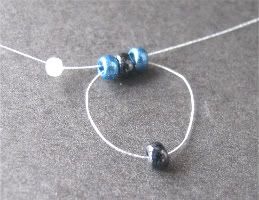
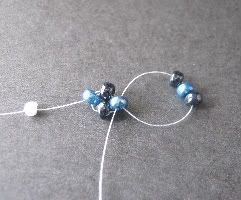
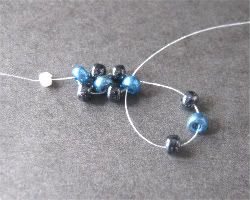
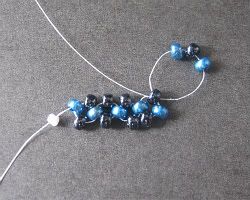
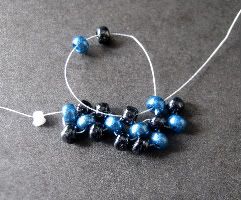







The joy of creating something can be an acquired taste, for sure. It all depends on what you enjoy making. There are people who would never dream of buying bread at the store, because they just love to make their own. I feel extremely fortunate to have a hobby that I love!
ReplyDeleteWonderful necklace. I'll have to try that technique...Thanks!!!
ReplyDeleteHi Mortira !
ReplyDeleteThat is a great post for RAW.
You make me want to try AGAIN.
My major problem is with tension -- do you have any tips to help me?
It seems mine is always too loose.
Katie B (coconutbead)
My trick for getting strong, even tension is to never stop tugging on that thread. Basically, every time you move your needle, stop and snug up the thread. For RAW, I pull at the end of each stitch, then again just before starting a new one.
ReplyDeleteAs with other stitches like peyote, sometimes it takes practice before you can get the same tension in the first few rows as the rest of the work. Keep practicing, and eventually you'll be doing near-perfect beadwork without knowing why it was so tricky before.
Making strips of right angle weave is a lot of fun! But how do you make them so thick? Do you fold the edges together lengthwise and zip them up to get a tube-like structure?
ReplyDeleteExactly! Because right angle weave edges are the same on all sides, you can connect them just about any way you like to make 3-D objects. This tutorial demonstrates the zipping technique with different sizes of seed beads:
Deletehttp://www.etsy.com/listing/79306890/bangle-beading-tutorial-right-angle
Thanks for sharing this. I usually did this is a different way but your technique is easier.
ReplyDelete